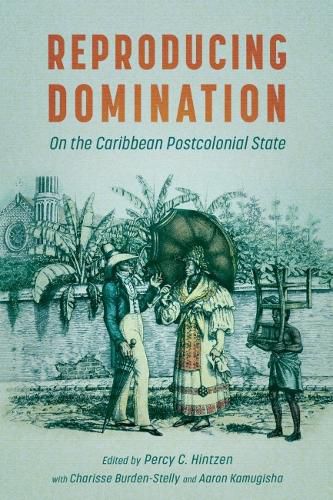Readings Newsletter
Become a Readings Member to make your shopping experience even easier.
Sign in or sign up for free!
You’re not far away from qualifying for FREE standard shipping within Australia
You’ve qualified for FREE standard shipping within Australia
The cart is loading…






This title is printed to order. This book may have been self-published. If so, we cannot guarantee the quality of the content. In the main most books will have gone through the editing process however some may not. We therefore suggest that you be aware of this before ordering this book. If in doubt check either the author or publisher’s details as we are unable to accept any returns unless they are faulty. Please contact us if you have any questions.
Reproducing Domination: On the Caribbean Postcolonial State collects thirteen key essays on the Caribbean by Percy C. Hintzen, the foremost political sociologist in Anglophone Caribbean studies. For the past thirty years, Hintzen has been one of the most articulate and discerning critics of the postcolonial state in Caribbean scholarship, making seminal contributions to the study of Caribbean politics, sociology, political economy, and diaspora studies. His work on the postcolonial elites in the region, first given full articulation in his book The Costs of Regime Survival: Racial Mobilization, Elite Domination, and Control of the State in Guyana and Trinidad, is unparalleled.
Reproducing Domination contains some of Hintzen’s most important Caribbean essays over a twenty-five-year period, from 1995 to the present. These works have broadened and deepened his earlier work in The Costs of Regime Survival to encompass the entire Anglophone Caribbean; interrogated the formation and consolidation of the postcolonial Anglophone Caribbean state; and theorized the role of race and ethnicity in Anglophone Caribbean politics. Given the recent global resurgence of interest in elite ownership patterns and their relationship to power and governance, Hintzen’s work assumes even more resonance beyond the shores of the Caribbean. This groundbreaking volume serves as an important guide for those concerned with tracing the consolidation of power in the new elite that emerged following flag independence in the 1960s.
$9.00 standard shipping within Australia
FREE standard shipping within Australia for orders over $100.00
Express & International shipping calculated at checkout
This title is printed to order. This book may have been self-published. If so, we cannot guarantee the quality of the content. In the main most books will have gone through the editing process however some may not. We therefore suggest that you be aware of this before ordering this book. If in doubt check either the author or publisher’s details as we are unable to accept any returns unless they are faulty. Please contact us if you have any questions.
Reproducing Domination: On the Caribbean Postcolonial State collects thirteen key essays on the Caribbean by Percy C. Hintzen, the foremost political sociologist in Anglophone Caribbean studies. For the past thirty years, Hintzen has been one of the most articulate and discerning critics of the postcolonial state in Caribbean scholarship, making seminal contributions to the study of Caribbean politics, sociology, political economy, and diaspora studies. His work on the postcolonial elites in the region, first given full articulation in his book The Costs of Regime Survival: Racial Mobilization, Elite Domination, and Control of the State in Guyana and Trinidad, is unparalleled.
Reproducing Domination contains some of Hintzen’s most important Caribbean essays over a twenty-five-year period, from 1995 to the present. These works have broadened and deepened his earlier work in The Costs of Regime Survival to encompass the entire Anglophone Caribbean; interrogated the formation and consolidation of the postcolonial Anglophone Caribbean state; and theorized the role of race and ethnicity in Anglophone Caribbean politics. Given the recent global resurgence of interest in elite ownership patterns and their relationship to power and governance, Hintzen’s work assumes even more resonance beyond the shores of the Caribbean. This groundbreaking volume serves as an important guide for those concerned with tracing the consolidation of power in the new elite that emerged following flag independence in the 1960s.